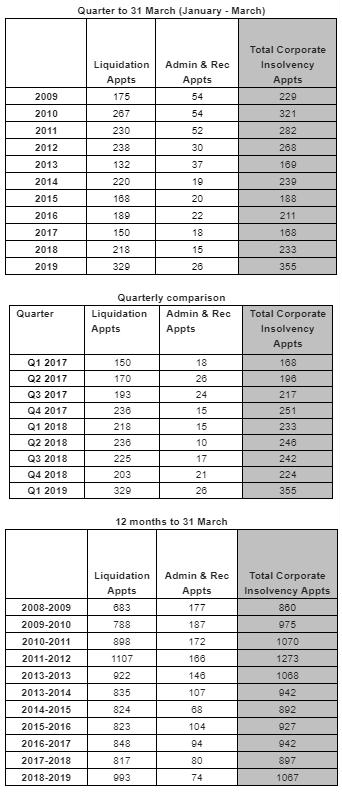KPMG: Rising Scottish business failures must be seen in historical context

Blair Nimmo
Insolvency statistics from professional services firm KPMG reveal the number of businesses failing in Scotland has increased by 52 per cent in the first three months of 2019, compared to the same period last year (355 up from 233).
A 12-month analysis (12 months to 31 March), however, reveals a less stark comparison, with a smaller increase of 19 per cent (1067 up from 897).
While administrations, which usually affect larger organisations, increased by 73 per cent compared to the same period in 2018 (26 up from 15), a 12-month comparison shows an eight per cent decrease in appointments (74 down from 80).
Liquidations, affecting smaller businesses, accounted for the majority of the insolvencies in the first quarter of the year, and increased by 62 per cent compared to the previous quarter (329 up from 203). A 12-month comparison reveals the number of liquidations also increased by 22 per cent (993 up from 817).
KPMG believes high numbers of liquidations reported may be due to the closure of businesses and shell companies which ceased trading some time ago, rather than an indicator of an unstable business landscape.

Blair Nimmo, global head of restructuring for KPMG, said: “The total number of administrations increased significantly compared to the same period last year, and indeed over last 12 months, albeit at lower levels.
“While there are a number of factors coming into play, it is likely a significant number of liquidation appointments can be attributed to housekeeping, whereby businesses and shell companies which ceased trading some time ago are liquidated as matter of course.
“Figures therefore do not fully reflect the wider picture of the Scottish business landscape, which, at the end of 2018 actually saw a fall in the total number of insolvencies. Analysis of the 12-month picture reinforces this – showing an eight per cent decrease in the number of administrations, which, against the uncertain economic backdrop most businesses are operating within at present, is encouraging.
“That being said, challenges undoubtedly remain for Scottish businesses, and the latest figures must be closely monitored. We haven’t seen a more uncertain and complex political environment in the UK for quite some time. As ever, we continue to encourage clients to develop robust contingency plans in the event continued Brexit uncertainty.
“Looking at the sectoral picture, alongside wider UK challenges, retail and food and drink continue to hit the headlines as businesses struggle against changing consumer attitudes, a tougher price-driven market and the impact of online. In Scotland, the construction and energy sectors continue to face their own, well-publicised challenges. Current market conditions are contributing to tough trading landscapes for many.
“Nevertheless, while most businesses wait with bated breath for a clear direction on Brexit, those organisations with sound business plans and effective leadership find themselves in relatively strong positions – able to continue growing in the face of uncertainty.”



